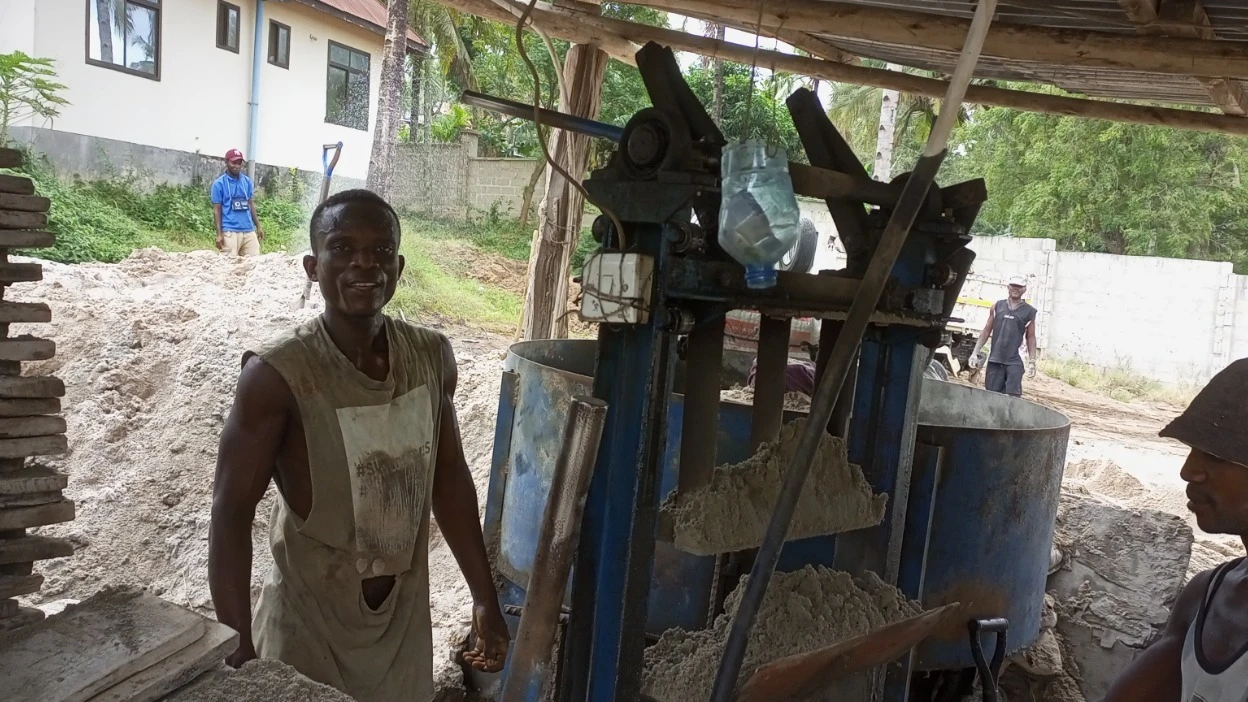SPECIAL REPORT: Concrete blocks business creating employment, raising climate change risks; health threats - 1

THE concrete blocks business is creating mass employment in Tanzania’s construction sector while on the other hand accelerating climate change risks through carbon emissions alongside health threats to humans.
The business has been a boom in recent years particularly in big cities such as Dar es Salaam where small-scale vibrated blocks industries are established to manufacture blocks and pelvic stones in the streets especially along the cities’ exit roads.
Investors are targeting profit maximization as a chunk of young men and adults from poor economic backgrounds rely on it for a daily living.
Along the concrete blocks manufacturing process, there is a significant depletion of the environment.
Simon Yonah, Manager at Samson Vibrated Blocks in Makulu Ward of Dodoma city said that the small-scale blocks manufacturing factory has recruited 16 youths.
He pays the mortar mixer machine operators 5,000/- each for every cement bag. There are two machines with each operated by two persons.
“Those who do the loading and unloading of purchased blocks are paid 4,000/- for every 100 blocks. Those who lay down the blocks are paid 200/- for every ten blocks. 4,000/- is paid to a person who does watering of the blocks in the morning and evenings,” said Yonah.
Yonah basked in the 10mn/- worth investment that has resulted in offering jobs to the youths as he emphasized that workers are responsible for their safety while at work.
Amani Jailos (20) a worker at Samson Vibrated Blocks said that he always takes with him torn clothes for wrapping up his hands while working because he is not provided with safety gear.
“Safety is not part of the agreement. Everyone must secure their own safety gear. I don’t have money to afford them, that's why I wrapped my hands and arms with this torn shirt,” said Jailos while busy laying down blocks.
The primary school leaver who couldn’t make it to secondary school is capable of laying down a minimum of 50 piles of ten blocks each in a space of three hours.
“I make between 15,000/- and 20,000/- a day from this job. I must take two cups of fresh milk every evening after work hours at least to relieve my throat from daylong inhalation of cement dust from dry blocks,” said Jailos while wiping his sweat.
Jailos is aware that dust from the blocks is likely to cause health threats that might require a reasonable amount of money for treatment that’s why he regularly takes fresh milk after work.
This is the case when the 2023/24 Tanzania Statistical Business Register Report by the National Bureau of Statistics (NBS) reveals that for Tanzania Mainland the real estate sector recorded a 0.1 percent of establishments of economic activities.
NBS states in the report that the construction sector has employed 8,246 persons during the period under review of which male account for 6,774 an equivalent of 82.1 percent.
It states that establishments in the Civil engineering sub-sector employ 52.8 percent of all persons employed in the sector whereas the construction of buildings employs 36.4 percent and specialized construction activities employs 10.8 percent.
“A total of 421 establishments are engaged in the construction sector for Tanzania Mainland, whereby establishments in the Construction of buildings account for 36.8 percent and specialized construction activities account for 36.6 percent each. Civil engineering accounts for 26.6 percent of all establishments in the sector,” reads the NBS report.
Globally, reports show that with the rapid growth of urbanization, cement factories are even playing a critical role in accelerating greenhouse emissions.
In February 2015 it was reported in Tanzania's Print outlet that the National Environment Management Council (NEMC) had indefinitely suspended the biggest cement producer in the country-Tanzania Portland Cement Company (TPCC) trading as Twiga Cement over environmental pollution.
The company was however required by the NEMC to pay 50million/- in penalty.
Information sourced from various environmental websites show that exploring sustainable alternatives to concrete blocks reveals many innovative materials designed to lessen environmental impacts.
The proposed alternative blocks address environmental concerns and offer various cost, maintenance, and installation benefits.
According to GreenMatch, an environmental news resource and research-led reports website, among various proposed alternative blocks to concrete are Hempcrete bricks.
These blocks are made from hemp and limestone and have a character of absorbing carbon over their lifetime.
The second type of blocks out of the six environment-friendly are Gent Waste Bricks made from estimated 63 percent recycled waste, the lime-cured brick sequesters carbon during curing, significantly reducing embodied carbon.
This journalist has established that construction projects using concrete blocks jeopardizes the Sustainable Development Goal No. 11 (SDG 11) which requires that sustainable habitats and communities must be developed in an inclusive-secured model for development of resilient cities with zero net emissions.
Moses Mwingwa (38) works at Kwa Mpemba Vibrated Block Manufacturing in Goba suburb of Ubungo district in Dar es Salaam said that he usually takes a cup of fresh milk every evening after work hours.
He is subjected to remuneration of 4,000/- for producing 40 blocks from a bag of cement. He normally works out seven bags of cement weighing 60 kilogrammes each on Monday to Fridays thus producing 280 concrete blocks.
“My boss has told me and my co-workers to secure our own protective gear. I am required to buy disposable face masks on my own if I feel like doing so but it isn’t the responsibility of my boss. I normally work barefaced,” said Mwingwa.
He said a box of disposable face masks with 20 pieces which he can consume for at least six days fetches 18,000/-, a huge amount for him to afford. Primo Dental Products states that people must change their disposable face masks after every four.
Mwingwa’s health risks which are likely to be triggered by his job resonates with Article 23 (1) of the Universal Declaration of Human Rights 1948, emphasizing that ‘Everyone has the right to work, to free choice of employment, to just and favourable conditions of work and to protection against unemployment.’
This journalists is aware that Section 62 of the Occupational Health and Safety Act 2003 highlight an obligation to all employers by stating: ‘Where in any factory or workplace, workers are employed in any process involving exposure to any injurious or offensive substance or environment, effective protective equipment shall be provided and maintained by employer for the use of the persons employed.’
Iligas Nahoda, Manager Kwa Mpemba Vibrated Blocks in Goba Dar es Salaam said that Mwingwa is one of 12 workers at the small-scale factory who are required to observe protective measures on their own since they are not recruited on contract terms.
“I have not recruited them on contract terms and for that reason they are responsible for their safety at place of work,” said Nahoda.
Khadija Mwenda, Chief Executive of the Occupational Safety and Health Agency (OSHA), said that whoever does not abide by the safety legislation at place of work is breaking the law and encouraged workers to report such employers to the OSHA for legal measures.
Dust from cement is likely to spur respiratory system disorders. According to the World Health Organization (WHO) lower respiratory infections is ranked number five in the top ten list of ‘Leading causes of death in 2021’ globally which in 2021 claimed 2.5 million lives, 370,000 fewer than in 2000.
Nehemiah Nnko, Medical Doctor at Magu District Hospital in Mwanza region said that dust from cement and mortar contain Respirable Crystalline Silica (RCS).
“RCS is also found in concrete and can lead to the development of silicosis or scarring of the lungs, which results in a loss of lung function and severe shortness of breath. Exposure to high concentrations can lead to death,” said Nnko.
The World Economic Forum (WEF) in its joint report with Oliver Wyman dubbed: ‘Nature Positive: Role of the Cement and Concrete Sector’ released September 2023, states that cement and concrete companies need to transform their business models to align with the global nature-positive and net-zero transition.
The WEF report points out that while 83 percent of Fortune Global 500 companies have climate change targets only 25 percent have freshwater consumption targets.
However, just five percent have targets for biodiversity loss with less than one percent understanding their dependencies.
The report notes that as of September 2023 the global cement and concrete products market value stood at USD 440 billion. Annual production of concrete stood at 14 billion cubic meters while the annual production of cement was pegged at 4.2 billion tons.
WEF calls for effective efforts from all cement and concrete companies worldwide to observe five critical roles: improve water stewardship across the value chain, reduce greenhouse gas emissions and other airborne emissions and thirdly to sustain and strengthen reclamation.
“However, the other two initiatives should be rehabilitation and biodiversity management, expand circularity across the value chain and lastly, accelerate innovation to support the nature-positive transition,” reads the WEF report in part.
To be continued.
Top Headlines
© 2024 IPPMEDIA.COM. ALL RIGHTS RESERVED

























